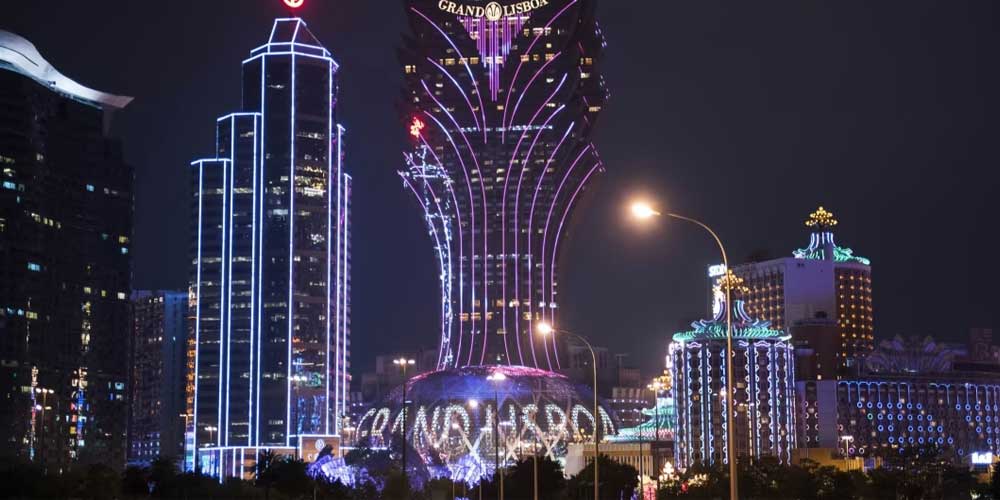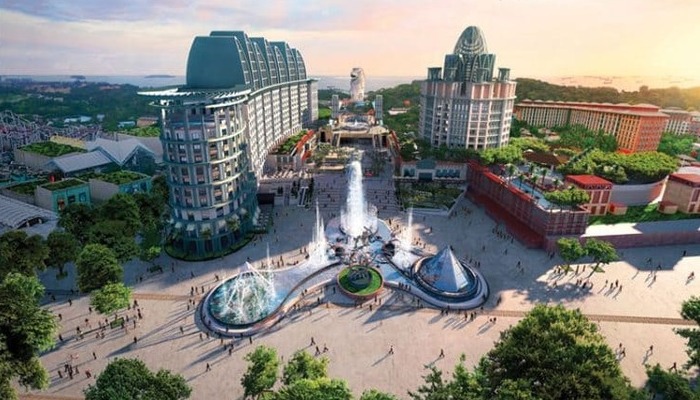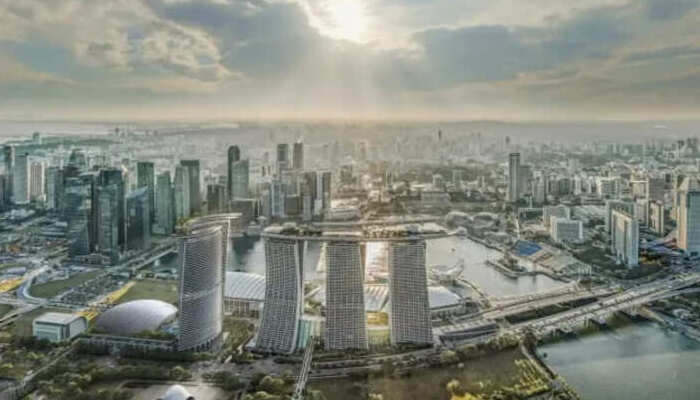
Casino mecca Macau gambles on becoming a global tourist attraction
Big Six operators will invest $15bn over 10 years, with more than 90% spent on non-gaming developments.
With its giant golden lotus flower skyscraper perched atop an egg-shaped dome, the Grand Lisboa casino resort has long been a landmark and symbol of prosperity and good fortune for the Chinese territory of Macau.
But as the city’s draconian zero-Covid restrictions ended last month, only a few dozen patrons were on the main gaming floor of the 14-year-old property, owned by the late gambling mogul Stanley Ho’s SJM Holdings. The lifting of restrictions had contributed to a high Covid infection rate among staff at Macau’s tallest building, while tourists were slow to return.
Almost half of its baccarat betting tables were left unattended or unused. An area for high-stakes betting was closed and its six restaurants, including the three-star Michelin-rated Robuchon au Dôme, were not fully open.
Prolonged pandemic border controls that had barred high rollers from mainland China — who used to make up over half of its gaming revenue — have crushed the Asian gaming mecca, the only place where casino gambling is legal in China. It has now given its gambling crown back to Las Vegas, with 2022 being one of Macau’s worst years on record.
In addition to trying to revive their core business, the six major gambling operators now have the extra burden of trying to build and expand non-gaming ventures. It was a requirement attached to the renewal of their licences on January 1, as the local government tries to diversify an economy dependent on gambling. Beijing was behind the move, said a senior casino executive.
“Macau has hit rock bottom,” said David Green, a gaming and governance consultant and former adviser to the Macau government on casino tenders. “[But it] has some breathing room, now that the new concession contracts contain some hard commitments to non-gaming investment.”
As part of the 10-year franchises — a shortened commitment compared with the previous two-decade pacts — the six incumbents, SJM Holdings, MGM China, Galaxy Entertainment, Melco Resorts, Sands China, and Wynn Macau, have pledged to invest a total of $14.9bn.
Sands and Galaxy will put in the most, spending $3.8bn and $3.5bn respectively. The rest will spend between $1.5bn and $2.2bn. More than 90 per cent will be on non-gaming developments, including theme parks, convention and exhibition venues and exploring overseas markets.
SJM, for example, said it would upgrade its convention and exhibition facilities and create a garden-themed venue to cater for small and medium-sized events, while Sands plans to add a glass conservatory to its 538,000 sq ft garden at its landmark Londoner casino resort, modelled on Singapore’s Gardens by the Bay.
While Macau is “ostensibly pursuing diversification away from gaming, it has a dilemma”, according to gaming consultant Green. The territory collects tax at the rate of about 40 per cent on gross gaming revenue and “if its diversification push is successful . . . the government will derive far less revenue”.
The gaming sector has accounted for more than 80 per cent of government revenues, while non-gaming activities provided an average of less than 15 per cent of the casinos’ overall revenues in 2019.
Eilo Yu, an associate professor of government and public administration at the University of Macau, said it remained to be seen whether non-gaming investments, such as upgrading convention and exhibition infrastructure “could generate profit sustaining the market mechanism”.
The experience in the past decade with casino groups like Sands’ investment in these areas had “proved that the market might not find the Mice [meetings, incentives, conferences, exhibitions] market attractive,” he said.
Rating agency Fitch’s senior director Colin Mansfield said that “gaming will continue to be a meaningful driver in concession operators’ operations” even as the Chinese city tries to match Las Vegas’s success in attracting an international audience by making Macau a global tourism destination.
While there are doubts over diversification, investors remained confident about the success of gambling after the announcement of the contract renewals. Shares of the Big Six casinos have rallied between 2 and 36 per cent over the past month.
The renewal of the US-owned casinos’ licences in particular came as a relief, amid accelerating US-China decoupling and souring relations, with the American groups relying heavily on their Asia properties to drive growth. “The Macau government managed to make a case for preserving the status quo in order to minimise disruption to an economy that has been severely battered,” said Ben Lee, an Asian gaming expert and managing partner at IGamiX Management and Consulting.
The first half of 2023 would be gloomy but a gradual revival was expected, analysts said. Fitch forecasts that Macau’s gaming revenue this year could reach 50 per cent of 2019 levels, but a full recovery would take at least another two years.
New laws that cracked down on VIP junket operations — where middlemen introduce high rollers to casinos — and the arrest and in-progress trial of Alvin Chau, who used to run the city’s biggest junket group, over alleged cross-border gaming offences, have also helped keep away the high-spending gamblers.
Macau recorded gross gaming revenue of just $5.3bn in 2022, a 51 per cent drop year on year and way below the $35bn it saw in 2019. Las Vegas recorded $7.5bn in the first 11 months of 2022.
A “permanent” loss of mainland Chinese high rollers could also mean a significant shrinking of revenues as the ratio of takings from mass-market players versus VIPs would probably shift from 50:50 to up to 90:10 in the post-Covid era, said Hoffman Ma, an executive at Success Universe, which has invested in SJM’s Ponte 16 resort.
That said, Ma is still confident Macau will overtake Vegas again in the next few years. “If Macau’s mass market can recover 100 per cent, that would already mean it would marginally surpass Vegas in revenue . . . even if the VIP market is not coming back,” he said.
Jorge Costa Oliveira, a former commissioner for legal affairs at the Macau Gaming Commission, said investors should be confident that Beijing wanted Macau’s fortunes to be restored, despite the tightening of rules.
“China needs Macau to be a successful case that can be shown to Taiwan and abroad,” he said.
For the first batches of returning mainland Chinese visitors after quarantine-free travel resumed, Macau remains a desirable destination and retains its glitz and glamour.
Sichuan tourist Xiang and his wife had been spending Rmb20,000 ($2,872) a day on average on their week-long trip and his mood had not been damped by losses at the Grand Lisboa’s tables.
“I just want to have a look around, gamble a bit, and have a bit of fun,” he said, as he took photos outside of his wife against a city centre background still largely devoid of people because of the Covid outbreak.
Source: https://www.ft.com/content/c997ce4b-f818-40ed-a0c5-752f32799a9c
Other Interesting: Top 5 Gambling-Related Mangas
See other website: Oriental Game
Other Interesting Articles
 Top 5 Gambling-Related Mangas
Top 5 Gambling-Related MangasJan 9, 2023











